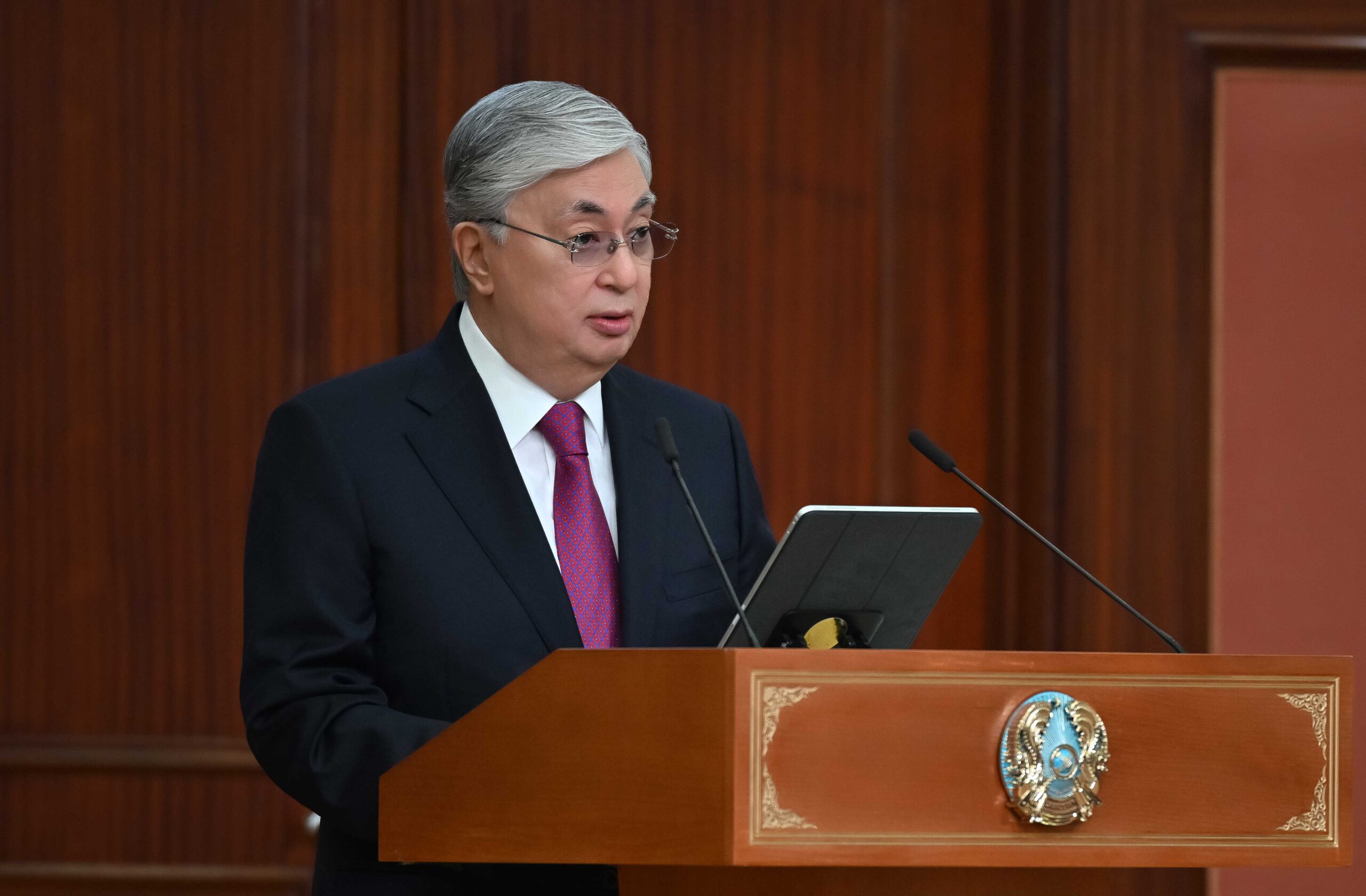ASTANA — President Kassym-Jomart Tokayev chaired a meeting in Astana on April 19, focusing on the nation’s socio-economic development. He once again exhorted the government to work more efficiently to address the country’s urgent problems as it tries to navigate the challenging times externally and internally.

President Kassym-Jomart Tokayev chaired a meeting in Astana on April 19. Photo credit: Akorda.
The meeting, which took place less than a month after Tokayev’s address to the first session of the Kazakh Parliament, included senior government officials, members of Parliament and maslikhats (local representative bodies), a rare instance when regional maslikhat officials attend a meeting of this level.
President Tokayev reiterated the need to diversify the economy, boost domestic production, upgrade agricultural storage facilities, expand financing opportunities for businesses and tighten the protection of women’s and children’s rights.
Tokayev said the low quality of work inhibits the implementation of reforms. “Some civil servants and heads [of state bodies] are indifferent to their work and are not active. They do not take responsibility,” he said.

Daniyar Ashimbayev. Photo credit: Ashimbayev’s personal archive.
Experts agreed with the President’s emphasis on the need to reform the public administration system and create a real dialogue between officials and citizens. “Unfortunately, certain tasks of the President tend not to be implemented or implemented fictitiously. (…) It is clear that the head of state is forced to personally remind which tasks need to be focused on, showing once again that whatever figures are presented to him by the government or ministers, he has relatively complete information that reflects the aspects that our officials often do not like to talk about out loud,” said political expert Daniyar Ashimbayev.
The expert sees big potential in local self-government in the country’s 223 maslikhats as the first line of interaction between the state and citizens.
“Now a lot depends on the maslikhats: they have to actualize and control how local problems are solved, but not to be a branch of the akimat [city administration] on stamping its decisions. The President said in his address to the heads of maslikhats that their primary task is to protect the interests of the local citizens and not to fall back on the rails of light populism,” said the expert.
Kazakhstan is in a middle-income trap
Tokayev said the economic inertia in the past ten years led the nation into a so-called middle-income trap. Yet, Kazakhstan wants to see itself among high-income countries. To achieve this, it needs to have a 6 percent annual economic growth, said Tokayev citing expert estimates.
Financial analyst Andrei Chebotarev said diversification is key. According to him, if Kazakhstan is able to carry out economic reforms, including the development and adoption of a new Tax Code and start relying less on the oil refining sector in GDP growth, then it may take five to seven years to escape from this trap.

Andrei Chebotarev. Photo credit: Chebotarev’s Finance KAZ Telegram channel
“There are steps in this direction, but they are tiny. For example, at the time of the pandemic, for the first time in Kazakhstan’s history, the manufacturing sector produced more than the mining sector. Now the mining sector is slightly above the manufacturing sector again. But growth is quite slow. We lack the brave steps for bold development. For example, an open land market could lead to quite a serious revolution in the agricultural sector, but many people here are not ready for that. The government wants to diversify, but it is business that does it,” said Chebotarev.
In his remarks, Tokayev highlighted the need to localize production in the manufacturing industry. He echoed the law on the industrial policy adopted in December 2021 that created conditions for the industry’s development and is expected to help Kazakhstan rely less on imports.
Chebotarev said the government needs to ensure “clear and transparent conditions of the game” for the market economy to function properly and for businesses to prosper.
Speaking about a middle-income trap, Kazakh economist Galymzhan Aitkazin said it has been present since 2013-2014 after Kazakhstan reached a peak per capita GDP of $13,000.
“Kazakhstan remains extremely dependent on oil sector revenues, and any shocks in this market can undermine the country’s economic and financial stability,” he noted, highlighting renewables as a promising area.
Economist and former advisor to the Chairman of the National Bank Aidarkhan Kusainov said the middle-income trap does not correspond to the real picture.
“In recent years, Kazakhstan’s economic growth rate has been lower than in the group of middle-income countries and even in the group of upper-middle-income countries. The controversial middle-income trap hypothesis could be invoked if the dynamics of Kazakhstan’s economic development were comparable,” he said.
In 2022, Kazakhstan’s economic growth reached 3.2 percent. In the first three months of 2023, it reached 4.9 percent, driven largely by the hydrocarbons sector.
Inflation rising
Inflation was another topic raised by Tokayev. It is a global problem that Kazakhstan has not been immune from. According to the National Bank, in March, annual inflation in the country slowed to 18.1 percent compared to 21.3 percent in February. The rise in food prices in March slowed down to 20.5 percent year on year.
On March 29, Tokayev tasked the government to halve the inflation rate by the end of this year.
The task is challenging, said Kazakh economist Galymzhan Aitkazin. According to him, it is compounded because the government and the National Bank are working in opposite directions.

Galymzhan Aitkazin. Photo credit: AERC.
“It is crucial that there is coordination within government agencies, which often inhibits or reduces the effectiveness of measures taken. A good example is the poor coordination between the government, as the fiscal authority which controls tax rates and public spending, and the monetary authority — the National Bank, which, in turn, affects the value and the amount of money in the economy,” said the economist.
Explaining in further detail, Aitkazin said when prices start to rise sharply, the National Bank increases the value of money in the economy to discourage consumption and save money, which can lead to a slowdown in the economy and a gradual decline in prices. This, however, goes contrary to what the government does, launching preferential programs and increasing government spending, he noted.
The government is expected to update the Kazakhstan 2050 strategic document to take into account current realities.
“We need new ways to ensure national security. For that, the relevant strategy should be revised according to the needs of the times. The concept of foreign policy should also be updated. This document was adopted in a completely different geopolitical situation. A lot has changed now. It is necessary to maintain internal security and strengthen the defense capabilities of Kazakhstan and the whole of Central Asia,” said Tokayev.

